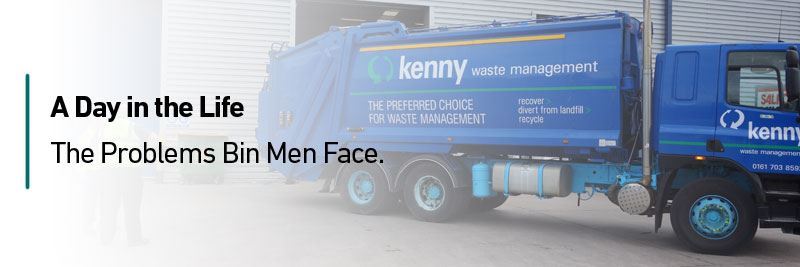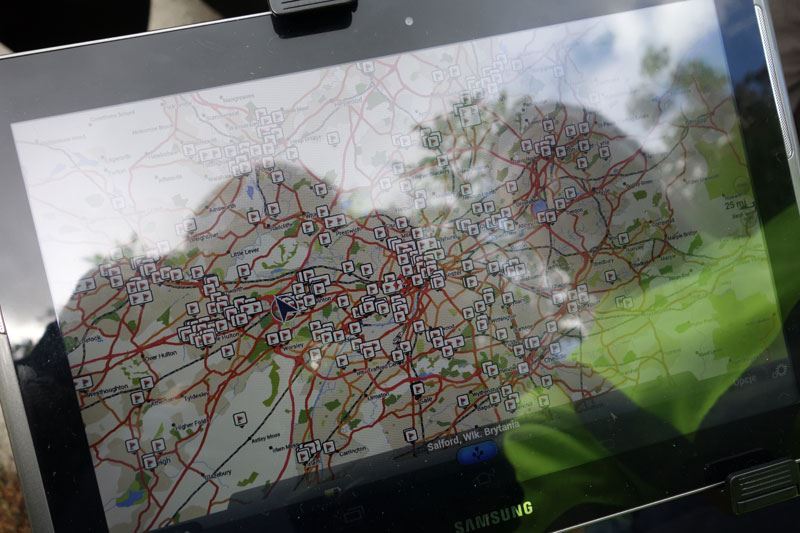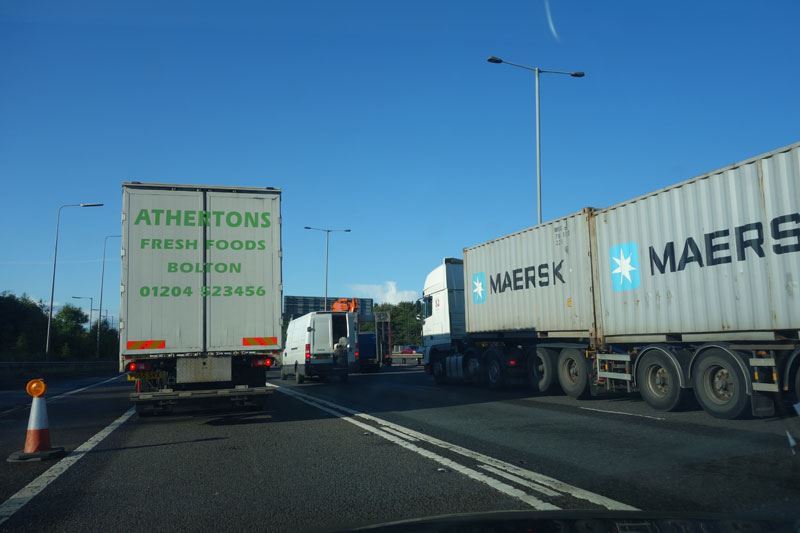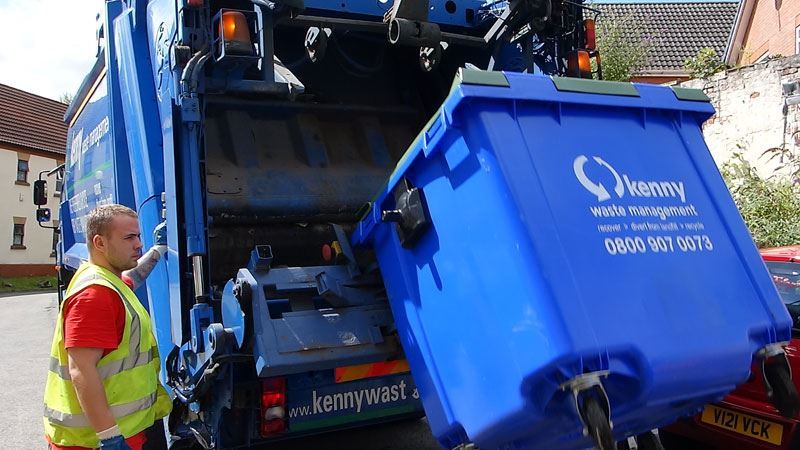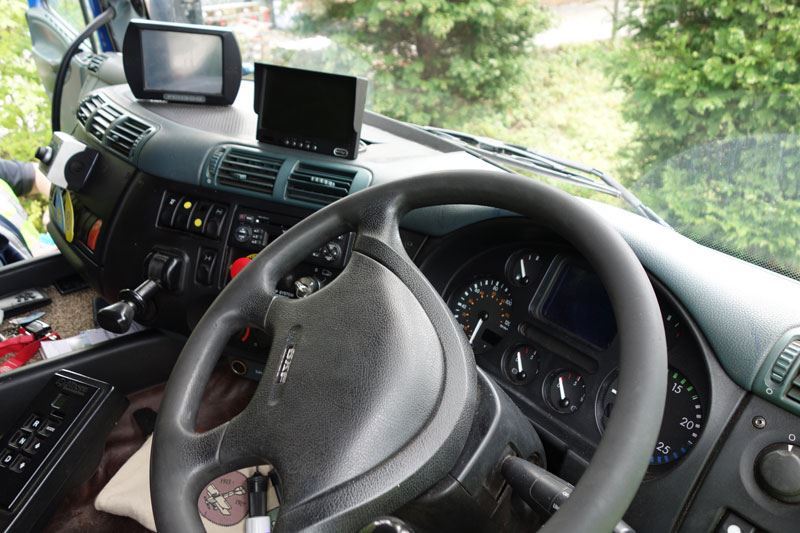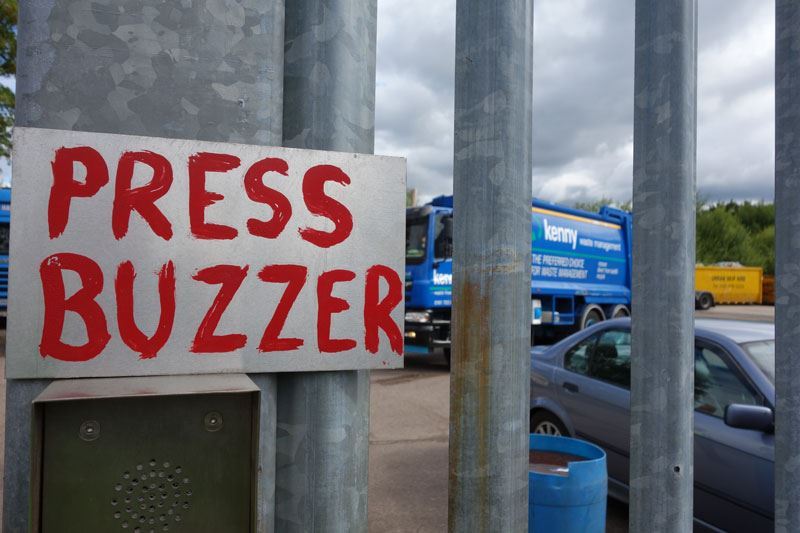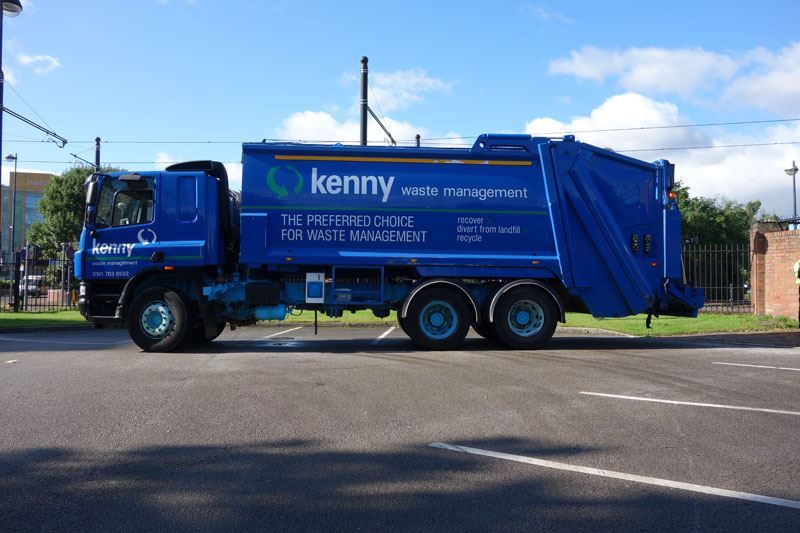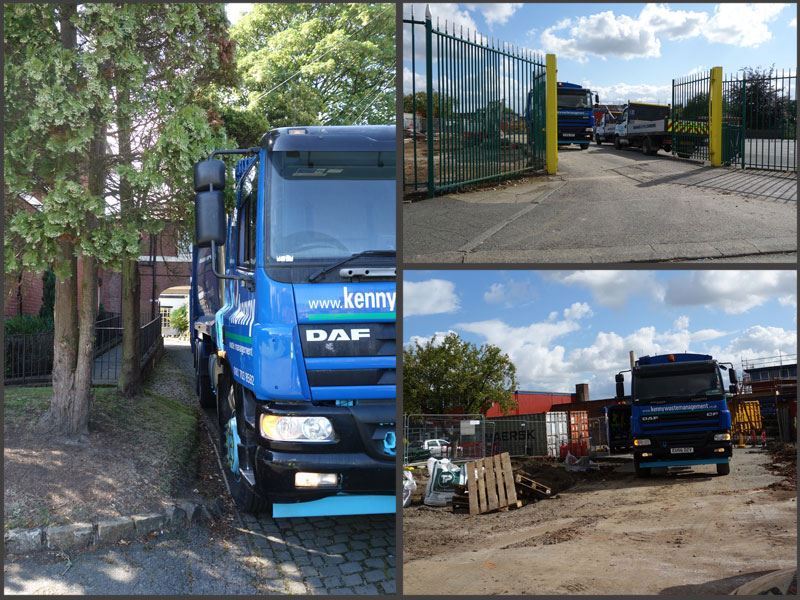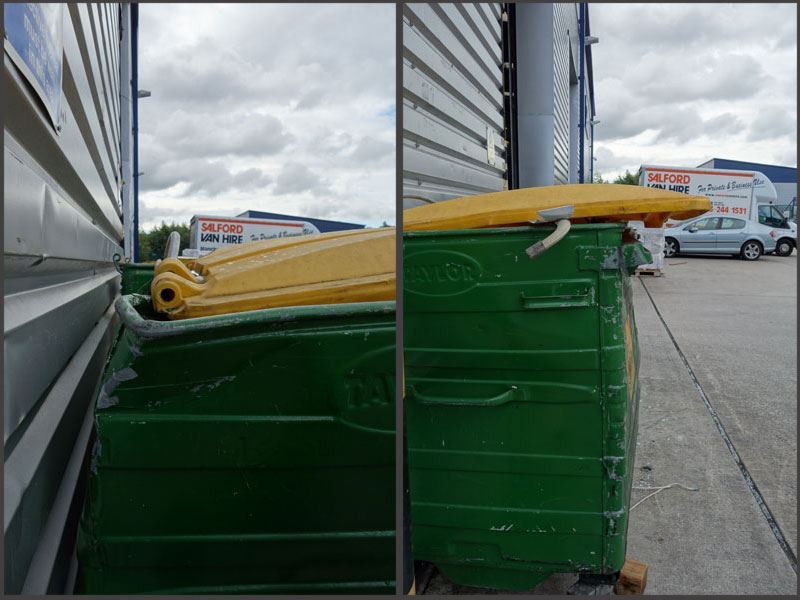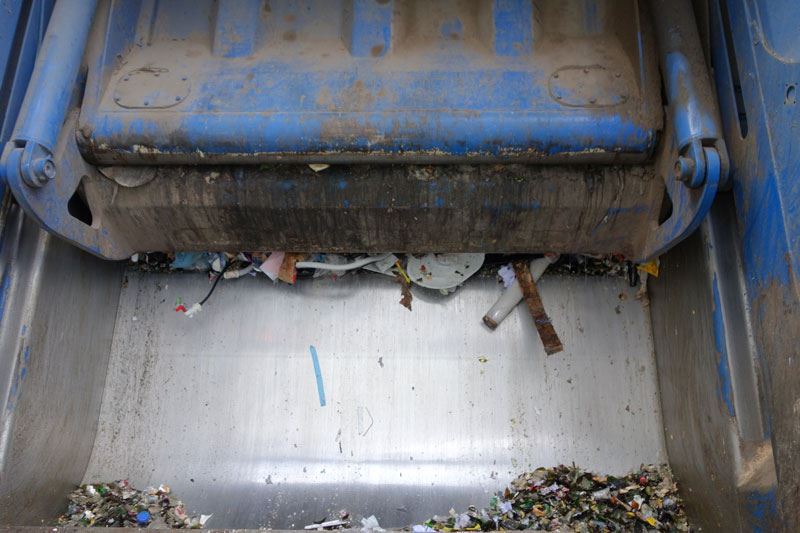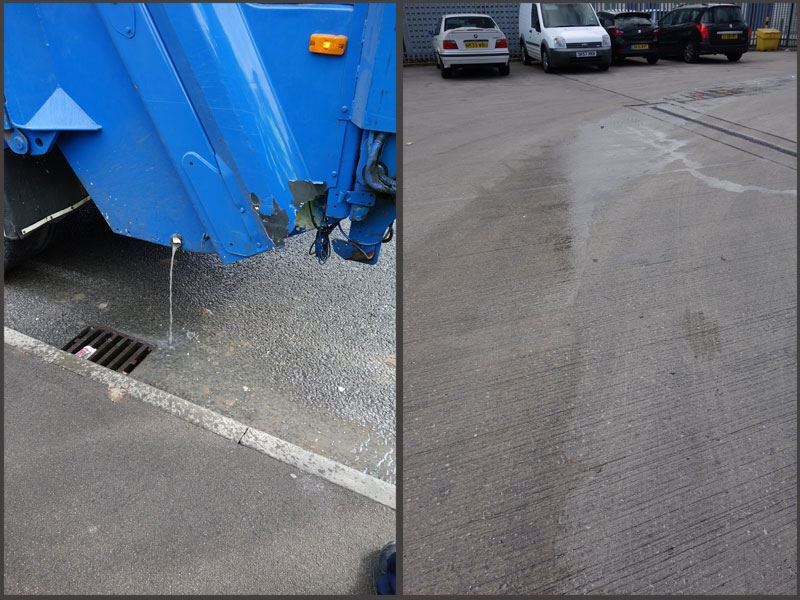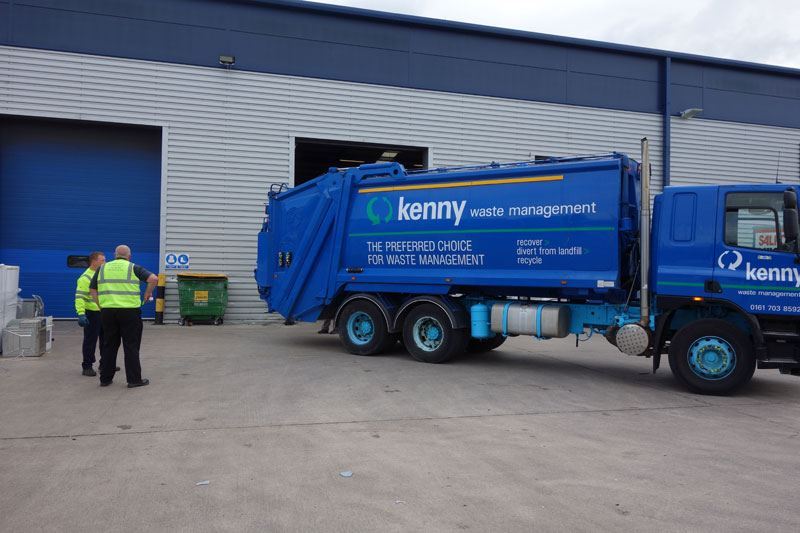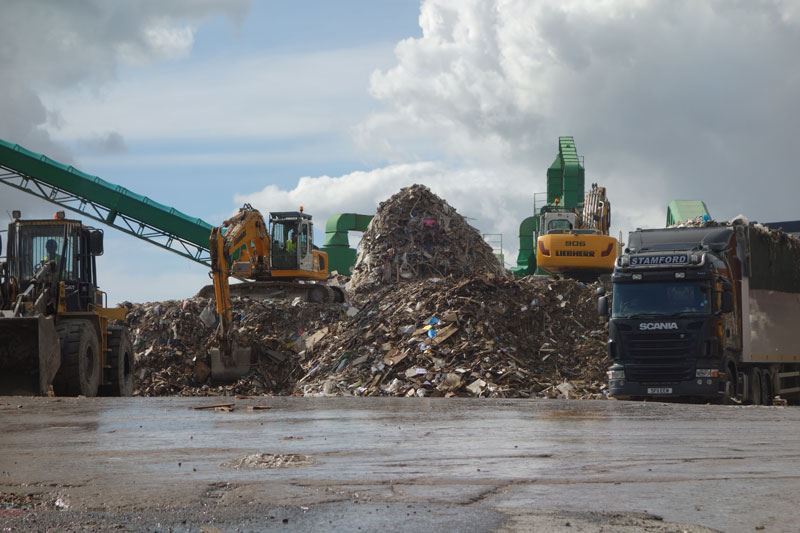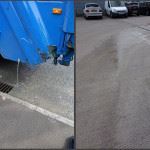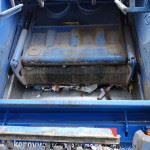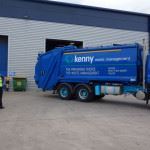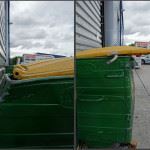Last Monday (18th August, 2014) I took a day out of my comfortable office job as a Social Media and Content Executive for Direct365 and spent the day finding out what it’s really like as a commercial bin man, whilst learning what challenges they come across day-in-day-out. I was welcomed by Kenny Waste Management – a company whom we work closely with at Direct365, and who I would be spending the day with.
The 7 tonne capacity diesel guzzler (pictured above) left the Kenny Waste depot to start its rounds at 5:30am with Lucas and Marchak (two of Kenny Waste’s finest bin men) at the helm. Due to strict health and safety restrictions, I was unable to travel with them inside the cab. Instead, I followed behind the truck on its rounds with Simon from Kenny’s, and would hop out at each stop, since I was fully-equipped with the correct PPE clothing and a trusty camera.
The first thing that struck me was the long days the bin men worked – despite Lucas and Marchak setting off from the depot at 5.30am, they wouldn’t return until between 4.30-5.30pm. Roughly a 12 hour working day. At the start of their shift, they jump into an empty, fully-fuelled truck, equipped with a waste collection sheet. This sheet was essentially a rough guide to a pre-planned route, which detailed everything the two would need throughout the day such as entry codes for certain sites, contact details, addresses, various scribblings of “Do not pick up before 8.30am” and other such notes; as well as the amount and size of bins they would be collecting.
Lucas held out a tablet filled with little red flags and simply said to me:
“This is what I will be collecting this week.”
What problems do bin men face?
Throughout the day we passed through Manchester, Sale, Bolton, Salford, Horwich, Wigan, and Westhoughton. It was at the start of the day, whilst Simon and I were driving through Manchester to catch up with the truck, during its collection from a Primary School, that he started telling me the things that make the job of bin men a little harder than it appears on the outside.
There was plenty of traffic so we had chance to cover a lot of the hidden problems, including congestion and traffic, which I was witnessing first hand.
Traffic
Through Manchester in particular the traffic drops down to a snail’s pace if you’re passing through after, say, 8am. One thing bin men and waste companies have to juggle is the noise pollution problem and subsequent complaints which flood in from doing collections in the early hours of the morning, with the productivity destroying 3mph crawl which is so common when trying to get through busy areas at peak times.
Overfilling and Cost-cutting
Some of the biggest problems for bin men come directly from the customer. Whilst ‘the customer is always right’ may be the first phrase that comes to mind in business, it isn’t always one that rings true for the individuals who take away your rubbish every day.
Whilst we were following the truck to the next stop (which was a local bar/restaurant), Simon began to tell me how customers would frequently overfill their bins – often in a cost cutting measure. Most bins we collected on the day were capable of holding 70kg each. An on board computer on the truck weighed every collection, adding it up to the 7 tonne capacity.
Stop after stop, Lucas would yell something out the window along the lines of “The last collection was 460 Kg, for 3 1100L” (this particular collection should have weighed no more than 210 Kg’s). Almost every collection weighed more than it should have, and this was a pattern I noticed after less than an hour, on my first day. After a while, I bluntly asked Simon why he thought this was, and his reply was simple: “Why pay for 3 bins, when you can overfill one?” Going on to explain the knock on effect this has on the day-to-day role of bin men like Lucas and Marchak:
“The bins aren’t always strong enough” he explains, stating how with a 70 kg suggested weight limit, filling bins up with over 200 kg or 300kg can put extra toll on the bins, which makes them liable to buckle at the bottom.
“It puts our staff at risk of injury” Simon explained, mentioning how pushing around and manoeuvring a 250 kg+ bin puts a huge toll on the staff. Even with wheels, such heavy weights can be very challenging to push around towards the truck, especially with tough terrain or hilly surfaces
“It strains our schedule and puts later collections in the day at risk of being missed” he continues, explaining that if you’ve planned to pick up a certain amount of bins in a day, all estimated at around 70 kg each, and after the first 5 stops every single one has been twice or three times over-filled, then the truck, that can only hold so much, risks later collections being omitted. It isn’t as simple as dropping waste off and going back out either – drivers are regulated by how long they can drive in a day, and when to take breaks. The tachograph would not allow their tight schedule to fit in drop-offs and return visits to missed collections.
Difficult Access
Navigating a huge truck down narrow streets, through key padded gates and in the busy centre of Manchester all pose problems to bin men.
Whilst it may seem fairly easy to manoeuvre the trucks around your estate, for your domestic collection – commercial premises present more problems. A good majority of the collections we attended last Monday were situated on industrial parks or hidden behind locked gates. Many of which a key was provided or a means of entry was previously arranged, like a code for a keypad. Some threw different challenges at us, like a truck unloading pallets in the entrance to one customer’s premises. Torn between wasting time waiting, or missing a collection and dealing with a customer service nightmare, Lucas and Marchak managed to skillfully manoeuvre their truck around an unloading HGV.
In the centre of Manchester and Bolton, the tight streets, double yellow lines and impatient traffic made collections a somewhat rushed affair, and one that required a waste truck to transform into a nimble and agile vehicle with 3 point turns, tight cornering and weaving around parked cars in a way that would ensure the ear-to-ear grin of any driving instructor.
Simon explained to me that:
“Despite their size, our trucks are usually expected to go everywhere that a car should be able to. A lot of it is down to the skill of the drivers – knowing alternative entrances and routes as well as precise driving to get into the tight spots.”
Access extends further than getting onto premises too. On our 5th stop following the Kenny Waste truck, we came across a commercial waste bin that had in some way or another been crushed, meaning it couldn’t support its own weight if it was to be picked up and tipped into the truck. Lucas had to no other choice but to take pictures of it and notify the customer of why there was a missed collection, before leaving the premises.
The ‘Wrong’ Waste
You wouldn’t think the wrong waste in a commercial waste bin would affect the people responsible for collecting and disposing of it; but it does. The vast majority of collections on the day were for general waste and dry mixed recycling (DMR), however many of these bins contained excessive amounts of glass and food waste. This is a problem…
Glass and food disposed of in the wrong bins caused a lot of problems for us throughout the day. For a start, they’re both very heavy and hold a lot of water (especially glass that hasn’t been properly emptied). It’s in Kenny’s best interest to keep their waste load as dry as possible as cardboard, paper and other dry recyclables can be rendered non-recyclable if they get too wet and break apart amidst the other waste.
When glass is emptied into the crusher at the back of a waste truck, it breaks up very finely and falls to the bottom of the loading bay. Problems arose from this when glass started dropping out of the side of the truck through a seep hole designed to let loose water out. Numerous times, Lucas and Marchak had to pull over and sweep up the glass that had come from customer’s bins, which should not contain glass to start with.
Distant Pick-ups
It’s ideal if a waste disposal company can populate and service their customers in a close-knit area. Often, it can be more cost-effective to turn down custom than it can be to accept jobs that sit a little out of their boundaries. Kenny Waste actively try to make their collections as smooth as possible, although sometimes certain customers will fall a little far apart. Within my first hour following the truck, we attended between 5-10 collections in quick succession. The last two hours of the day, however, was spent driving out to distant collections. Three of them, to be precise. This is all in a near-full capacity truck which at this point will do well to get over 3mpg on hills.
The Final Drop-off
Lucas said “It’s been a very good day today, and we’re 40 minutes ahead of schedule”. This 40 minutes gain still only meant getting back to the Kenny Waste depot at around 4:30pm, meaning that Lucas and Marchak were coming to the end of their 11 hour day.
They drove the truck into the plant where it would unload and the job would be passed onto the next person, in charge of organising and sorting the waste and disposing of it into landfill, recycling it, or re-using it.
The truck would then be re-fuelled, and ready to be taken out tomorrow with a fresh schedule and new pick-ups.
Working the bins is a lot more than simply tipping rubbish into an enormous vehicle. There are a lot of logistics involved, problems to face, and timings and regulations to adhere to. It is something that must be fulfilled, regardless of the problems that may present themselves throughout the day.
Get an instant quote on your waste service here.
- Water leaking
- Me (Laurence) disproving of the weight of one customer’s bin.
- Yellow and Green Bin, with Marchak operating the rear-loader
- Truck controls
- Mixed Recycling sign
- The depot
- Close up of Kenny bin
- Kenny truck, side view
- The truck squeezing into some tight spaces
- Traffic.
- Collecting from a school
- Marchak emptying a bin near the end of the shift
- Lucas (right) showing me his pick up points
- Kenny Waste Bins
- The rear crusher
- Marchak operating the truck
- Marchak operating the truck
- Press Buzzer for entry
- PPE
- A meeting between Simon (Right) Lucas (Hi vizability jumper) and Marchak (Red sleeves)
- A day in the life
- The inside of the truck
- The back of the truck
- The compacter in action
- A collection around lunchtime
- A broken bin.

